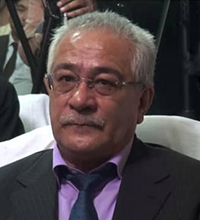Uzbekistan Perspective: Ensuring Regional Security and Countering Extremism and Terrorism

By H.E Ismatulla Irgashev
I would like to present our vision of the prospects for the development of the situation in Central Asia, including Afghanistan, which we regard as an integral part of our region.
Today, Central Asia is experiencing an unprecedented transitional period. Adoption of the “Strengthening regional and international cooperation to ensure peace, stability and sustainable development in the Central Asian Region” resolution last June by the UN General Assembly had become a recognition of the consolidation of the countries of the region, demonstration of their ability to work together to address the existing challenges, ensure security and sustainable development.
Obviously, the prospects for sustainable development of Central Asia are inextricably linked to peace in neighboring Afghanistan. We welcome and support the intensification of international efforts to resolve the conflict in neighboring Afghanistan.
I would like to highlight that one of the most important factors contributing to a noticeable advancement of the internal Afghan peace process was the Tashkent High-Level Conference on Afghanistan, which was held last March upon the initiative of the presidents of Uzbekistan and Afghanistan.
The key outcome of the forum was the unanimous adoption of the Tashkent Declaration, which enshrined the movement toward consensus at the regional and global levels based on the conditions for establishing long-term peace and stability in Afghanistan. It is necessary to further support this process.
The sustainability of all peace agreements in Afghanistan will depend, first of all, on the involvement of all internal Afghan political forces. Nobody should remain outside the peaceful political process. I am convinced that the consolidation of the entire Afghan society around the national interests for the sake of peace and prosperity in the country is vital.
The preservation of state institutions in key areas such as law enforcement, development of civil society, good governance, women's rights and others is important to reach the agreements between the confronting sides.
To further advance the peace process and ensure its inclusivity, Uzbekistan had held a number of talks with Afghan leadership and representatives of the leading political forces of Afghanistan, including the Taliban movement.
We have repeatedly stated that we stand ready to create all the necessary conditions for hosting direct talks between the Government of Afghanistan and the Taliban movement in Uzbekistan, at any stage of the peace process.
At the same time, we believe it is essential to continue to be committed to the fundamental principle - the political process of establishing lasting peace in Afghanistan should be Afghan-owned and Afghan-led.
We also believe that in order to advance the peace process in Afghanistan, it is necessary to achieve a consolidated regional approach. The peace plan should be supported by both neighboring countries of Afghanistan and the international community as well. In our opinion, it is necessary to pay attention to the following key factors:
a) The withdrawal of troops from Afghanistan should be gradual, excluding the creation of a vacuum in the country, which can be filled in by international terrorist organizations;
b) It is important to develop a mechanism for ensuring guarantees of the implementation of the agreements that will be reached between the official Kabul and the Taliban;
c) Equally important is the period of post-conflict development of Afghanistan that is restoration of its socio-economic infrastructure. Here, a special role should be played by major powers, donor countries, the EU and the states of the region.
Along with the political reconciliation efforts of the sides, we are also investing in the economic future, the social stability of Afghanistan as well as the young generation of Afghans. In this regard, we have embarked on the joint implementation of large projects in Afghanistan in transport connectivity, energy, trade and education. These include the construction of a “Surkhan-Puli-Khumri” power line by Uzbekistan, the opening of an Education Center for Training Afghan Citizens in Termez and a Logistics Center “Termez-Kargo”, development of “Mazar-i-Sharif-Herat” railway project.
We are also closely cooperating with Afghanistan, Kazakhstan, Pakistan and Russia in the implementation of another important project, the construction of the “Mazar-i-Sharif-Kabul-Peshawar” railway.
This road will connect Central and South Asia, promote closer economic contact between various states, as well as bring more active involvement of Afghanistan in regional integration processes. In this context, it is very important to provide financial support for these projects through scheduled International consortium.
In addition, this year the next 8th ministerial meeting of the Conference of Regional Economic Cooperation on Afghanistan (RECCA-VIII) is to be held in Tashkent. I am confident that it will serve to more actively engagement of the country in regional integration processes.
In conclusion, I would like to emphasize that Uzbekistan intends to continue to do its utmost to strengthen mutual trust in Central Asia and increase the effectiveness of our cooperation in addressing urgent regional challenges, including resolving the Afghan crisis.
H.E. Ismatulla Irgashev, Special Representative of the President of the Republic of Uzbekistan for Islamic Republic of Afghanistan.
Academicians and Officials interested to publish their academic pieces on this page, please approach us through: opinions@aiss.af
The article does not reflect the official opinion of the AISS
